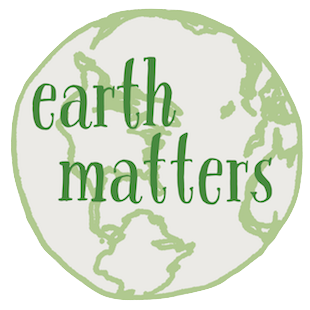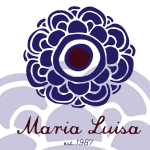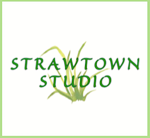by Susan Hellauer
 Earth Matters focuses on conservation, sustainability, recycling and healthy living. This weekly series is brought to you by Green Meadow Waldorf School, Maria Luisa Boutique and Strawtown Studio.
Earth Matters focuses on conservation, sustainability, recycling and healthy living. This weekly series is brought to you by Green Meadow Waldorf School, Maria Luisa Boutique and Strawtown Studio.If Earth Matters to you, sign up for our mailing list and get the next installment delivered right to your inbox.
It’s 8a (or 10a or 1p or 4p), and what’s that in your hand? A takeout cup of hot coffee that has set you back more than you put into the collection plate at your nephew’s first communion. But it was made exactly to your finicky order, good to the last drop and then you toss the cup and get on with your day.
Wait a minute. Should you recycle these things? Or maybe compost them? What about reusing the disposable cup for tomorrow’s commuting coffee? Reheat it at work a couple of times and don’t feel so guilty about throwing the cup into the trash?
Rewind. All of that.
What you don’t know about disposable hot cups
Every year, Americans toss about 60 BILLION paper hot cups into the trash. And that also means about 20 million trees harvested just for cups; 600,000,000+ pounds of waste generated; and 6,000,000+ tons of CO2 emissions.
So, again, why not recycle these cups?
If you’re stuck with polystyrene foam—aka (incorrectly) styrofoam—from Dunkin’ Donuts or the gas station, it probably can’t be recycled. Most places (including Rockland County) lack the special equipment needed to compress the air-puffed polystyrene, which is aerodynamically designed to blow into a storm drain somewhere.

Photo: Stand.Earth
If you’ve got a typical paper hot cup, it’s lined with polyethylene—what they make plastic bags from. That petroleum-based lining keeps the hot liquid from seeping through the paper cup, but it will also gum up most recycling works.
How about the compost heap? Nope. Too much plastic.
So the correct destination, here and now, is the landfill, where your daily plastic-lined cup(s) will hang out with billions of others for decades.
Hot liquids in plastic: not everyone’s a fan
Your favorite daily vice (overpriced takeout coffee) is poured piping hot into a petrified plastic bag, and not everyone is comfortable about combining plastic containers with hot liquids or foods.
Certain plastics—bisphenol-A (BPA) and pthalates (with links to cancer and other disorders)—have been removed from most food and baby-related products. Although hot-cup polyethylene has not been directly connected with human harm to date, evidence continues to mount that many kinds of plastic, leached from containers into food and beverages, can also have negative health effects–something to ponder before you reheat that paper cup of of half-caf latte in the microwave.
The disposable hot cup holy grail?
Big companies like Starbucks, McDonald’s and Dunkin’ Donuts want to score green points with their customers. Their corporate missions include sustainable food sourcing and reduction of food container waste. In 1997, under pressure from the Environmental Defense Fund (EDF), Starbucks went from serving hot beverages in double cups to using the now-familiar partly-recycled hot cup sleeve. The change resulted in a significant savings in paper–and trees, and trash. But for some observers, that was not nearly enough.

Starbucks shareholders are greeted by Stand.Earth “cup monster” in March 2017. Photo: Stand.Earth via Facebook
Starbucks shareholders at last month’s annual meeting near Seattle were greeted by a “cup monster” sculpture, created by a local environmental group to protest the coffee giant’s long-delayed switch to universally recyclable hot cups. (A recyclable prototype was tested in 2016, but no results have been reported yet.) Starbucks responded to the protesters by pointing out that its cups use 10% post-consumer material, and were recyclable in some places. (Starbucks did not return our request for clarification.)
Foam cups are cheap and good at keeping beverages hot and fingers cool, but they contain styrene, which is “reasonably anticipated to be a carcinogen” by the National Institutes of Health (NIH) (although their studies focused on workers who handle lots of styrene, rather than on foam-cup coffee drinkers). McDonald’s was also under pressure from the EDF and the fast food titan dumped its polystyrene foam clamshell containers in the mid 1990s. The move saved mountains of petroleum-based waste. Then, in 2013, McDonald’s finally got rid of the stuff in its hot beverage containers.

Hot coffee in polystyrene foam. Photo: Dunkin’ Brands
Dunkin’, however, still struggles to find a satisfactory replacement for its foam cups for brewed coffee. (Dunkin’ Donuts’s espresso drinks are cooler and are served in paper cups.) A company spokesman wrote in an email that tests with polypropylene and double-walled paper cups were unsuccessful because of the high cost and unsatisfactory lids. He also said that the company “will continue to test all available cups and lids.”
While foam cups take less energy and resources to make than plastic-lined cups, they are notorious for contaminating waterways, disintegrating into toxic, non-biodegradeable ocean-going bits.
How to drink green(er) coffee
There are plant-based hot cup linings out there, but such cups still take a whole lot longer than broccoli stems to biodegrade. Manufacturers recommend that such cups be commercially composted (not in your mom’s compost bin). Most municipal composters and recyclers can’t handle them yet, which could lead to consumer confusion.
Not everyone agrees on the greenest path through the hot cup forest. After all, it takes energy and resources to manufacture and wash your reusable coffee container, too. What to do?

Photo: Stand.Earth via Facebook
Well, consider this: In the mid ’90s, new EPA regulations changed the municipal-waste landscape from many local sites to a few huge (and growing) mega-dumps in each state. That coffee cup in your hand is going to be hauled about 300 diesel-fuming 18-wheeler miles to a landfill upstate, where people live unhappily with growing mountains of Rockland County trash.
To help you with your greener-coffee choices, Earth Matters visited six java joints in and around Nyack: three corporate and three locally owned. Here’s how each of them fell out on the hot cup mess-o-meter. (And remember, one of the greenest things you can do is to let your favorite coffee places or their corporate masters know how you feel about non-recyclable, non-compostable hot cup waste—and those lids, too.)

McCafe Latte, paper cup. Photo: McDonalds Media
The corporate ubiquities (in alphabetical order)
Dunkin’ Donuts, the Massachusetts-based coffee-and-baked-goods shops (some franchises and some corporate-owned). We visited the store on Route 59, just west of 9W.
Bring your own container and DD will fill it with whatever you order, be it ordinary coffee or a specialty brew. They make the espresso drinks right in your container, so no disposable cups are wasted. No discount is offered for bringing your own cup.
McDonald’s. It’s home to a surprisingly good $1 cup of coffee—though not quite as good since they dropped Newman’s Own Organic a couple of years ago. We visited the Route 59 and Waldron Ave. branch office.
Like DD, they’ll fill your own container with whatever drink you like, even from the drive-thru window. No discount but, really, are you going to complain about their disco-era coffee prices?
Starbucks. Your downtown-Nyack corporate cafe has publicized efforts to green their operation for many years, including waste diversion, “grounds for your garden,” along with sustainable and fair trade sourcing of coffee beans and food ingredients.
If you’re going to drink your concoction at the store, ask for it in a mug. Or bring your own container for any beverage and get a 10 cent discount.
The independent locals
Gypsy Donut. This quirky donut bakery on Franklin Ave. is an epicurean coffee bar as well, serving Portland, Oregon’s Stumptown brews exclusively.
Bring your own container for a 25-cent discount on all drinks, which can also be served in ceramic cups and mugs to enjoy in their cozy seating areas.

Pie Lady and Son. Photo courtesy Pie Lady and Son via Facebook
Pie Lady and Son. In an Upper Nyack mini-strip-mall storefront on Route 9W, this check-curtained shrine to homemade pie is a favorite of bicycle tourists. It features strong and smooth Witches Brew coffees from Tarrytown’s Coffee Labs roastery.
Take your coffee in one of their mugs, or bring your own container and they’ll fill it with any beverage. They’ll even pre-heat your thermos with boiling water—a plus for a frosty morning or a long commute. No discount is offered but, said owner Wil (with a wink), “I’ve yet to meet the customer who believes their container to be anything but ‘a small,’ so there is some discount baked in there.”
The Runcible Spoon Bakery. This airy North Broadway pastry and sandwich cafe has long been a favorite stop for bikers (with motor and without), as well as for locals.
They’ll serve your drink in a ceramic mug; or, bring your own container and get any size coffee for a flat $1.50 (plus tax), a 35 cent savings over their smallest serving. That rivals McD’s for price, and you get to sit in a pleasant Nyack cafe with big bright windows and no fast-food smells.
LATE-BREAKING FIND: You don’t have to hike or drive to McD’s for a $1 cuppa joe. The Nyack Gourmet on North Broadway has fresh, tasty coffee for just a buck. You’re encouraged to bring your own container, or have it “to stay” in an artsy Jane Herold pottery mug.

Moments of joy, decades in the landfill. Photo: Dunkin Brands Media
Learn more:
- Nyack Sketch Log on Pie Lady & Son (5/22/2012)
- “The Sad Demise of the Paper Coffee Cup,” United Nations University (3/3/2009)
- The UK is considering a tax on disposable coffee cups
- Stand.Earth’s Starbucks “Better Cup” Campaign
- “San Francisco Bans Polystyrene Foam,” Ocean Conservancy (7/7/16)
Earth Matters, a weekly feature that focuses on conservation, sustainability, recycling and healthy living, is sponsored by Green Meadow Waldorf School, Maria Luisa Boutique and Strawtown Studio.
Read Earth Matters every Saturday on Nyack News And Views, or sign up for the Earth Matters mailing list.











